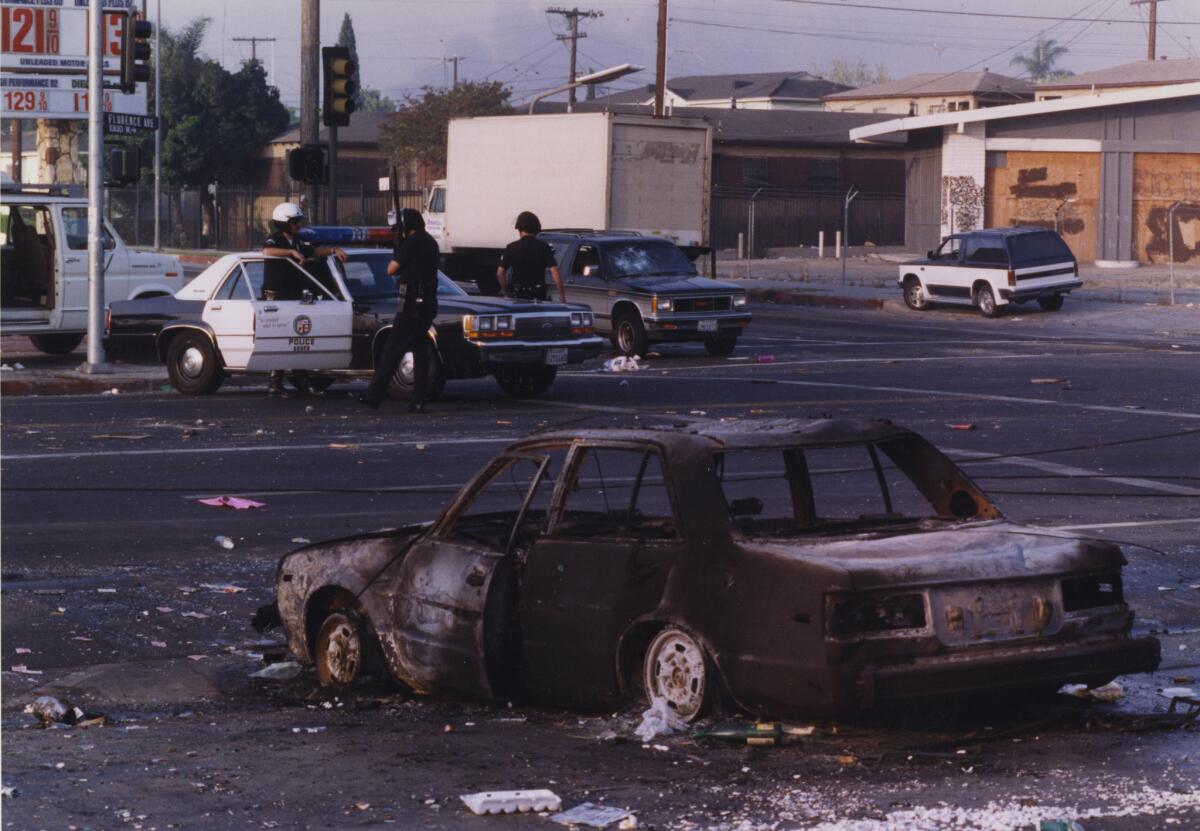Newton: The night the LAPD failed

A burned-out car is seen at the intersection of Florence and Normandie on April 29, 1992.
- Share via
The Los Angeles riots represented the culmination of many failures: the failure to provide hope for young people; the failure to supply education and jobs in the numbers that would stabilize communities; the failure to engage those communities in their own protection instead of relying on harsh and coercive law enforcement.
But on the night of April 29, 1992, 20 years ago today, the overriding failure was that of the Los Angeles Police Department and its chief, Daryl F. Gates. The LAPD has a civic duty “to protect and to serve”; that night, it did neither.
I witnessed that lapse firsthand. On the afternoon that the verdicts were read in Simi Valley, my colleague Rick Serrano, who covered the LAPD, was in the courtroom. I was a 29-year-old reporter newly assigned to the paper’s downtown newsroom. Because Serrano was tied up, I was asked to spend the afternoon at Parker Center, the headquarters of the LAPD, and to record the reaction to the verdicts.
They were announced in mid-afternoon, and most of the officers I saw seemed subdued. A few pumped fists or quietly expressed satisfaction that the jury had sided with their colleagues, but there were no celebrations or exultation — at least in front of a reporter.
Outside, by contrast, there was shock and dismay. It was a hot day, and on the streets of what was then still called South-Central, anger swelled in the heat. People who had gathered in the expectation of seeing officers punished for a brutal beating instead saw them vindicated.
Late that afternoon, when a group of young men at Florence and Normandie beat Reginald Denny to a pulp, smashing his head with a brick, police held back.
The message seemed fairly clear: The LAPD, so long accused of brutality, on this night was unwilling to risk confrontation. Outside Parker Center, a growing mob gathered in the hours after the verdict and taunted the police inside. I stood beside two members of the Police Commission as rocks and chunks of concrete began to pelt the building. Officers fingered their weapons nervously but did not respond. It was not their fault: Warned not to confront the angry crowd and equipped with no other plan, they waited for orders that did not come.
Gates, who had not spoken to Mayor Tom Bradley in more than a year, had left headquarters to attend a gathering in Brentwood to raise money for defeating proposed reforms of his department. As the violence outside his office escalated, Gates was unreachable. Protesters turned over a guard shack and set it on fire. Police watched.
I recently was given a photograph of that police guard shack on fire. In the picture, I’m on the edge of the crowd, taking notes, a conspicuously white guy with a necktie, lit by firelight. There is not a police officer to be seen. Gates later accused me of lacking standing to criticize the department’s performance on April 29. In fact, I was there; he wasn’t.
In the grand, violent history of Los Angeles, there are plenty of moments inspired by greed and vengeance and lust; there are, in addition, two monumental personal failures: William Mulholland’s tragic miscalculation at the St. Francis Dam that led to its collapse in 1928, killing hundreds and shattering the great engineer’s reputation, and Gates’ absence on April 29, 1992.
Analyzing the LAPD’s performance that night and in the chaotic days that followed, a commission chaired by William Webster, the former director of the FBI and CIA, concluded that the department’s lack of readiness was a “cause for grave concern” and warranted a substantial overhaul of the LAPD. Gates was forced from his job, and his successors remade the department.
It was, for Gates, the tragic end to a mixed career. In his heyday, he was regarded as one of the LAPD’s finest staff officers (many consider him the greatest deputy chief in the LAPD’s history). And he was an honest, devoted public servant who gave much to this city. But he also was a reckless blowhard who deliberately antagonized many well-meaning residents and abandoned his post at the moment leadership was most required.
Then again, there is the question of what he might have done if he had been in his office that evening rather than politicking across town. After the Webster report was released, here was Gates’ response: “Clearly that night we should have gone down there and shot a few people. In retrospect, that’s exactly what we should have done. We should have blown a few heads off.”
More to Read
Sign up for Essential California
The most important California stories and recommendations in your inbox every morning.
You may occasionally receive promotional content from the Los Angeles Times.











